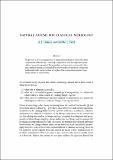Natural axioms for classical mereology
Abstract
We present a new axiomatization of classical mereology in which the three components of the theory—ordering, composition, and decomposition principles—are neatly separated. The equivalence of our axiom system with other, more familiar systems is established by purely deductive methods, along with additional results on the relative strengths of the composition and decomposition axioms of each system.
Citation
Cotnoir , A & Varzi , A 2019 , ' Natural axioms for classical mereology ' , The Review of Symbolic Logic , vol. 12 , no. 1 , pp. 201-208 . https://doi.org/10.1017/S1755020318000412
Publication
The Review of Symbolic Logic
Status
Peer reviewed
ISSN
1755-0203Type
Journal article
Description
The research and writing of this paper was supported by a 2017–2018 Leverhulme Research Fellowship from the Leverhulme Trust.Collections
Items in the St Andrews Research Repository are protected by copyright, with all rights reserved, unless otherwise indicated.

